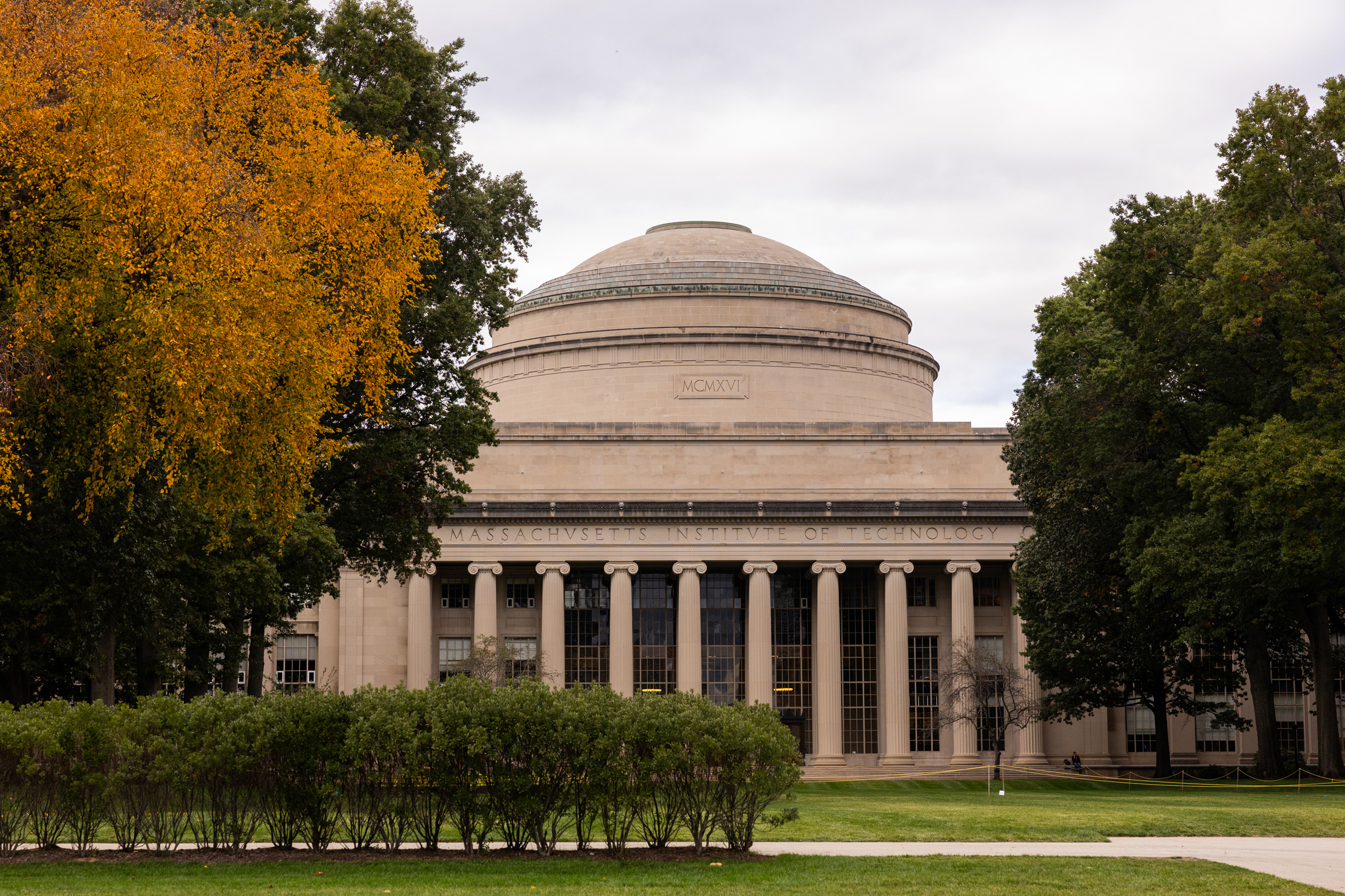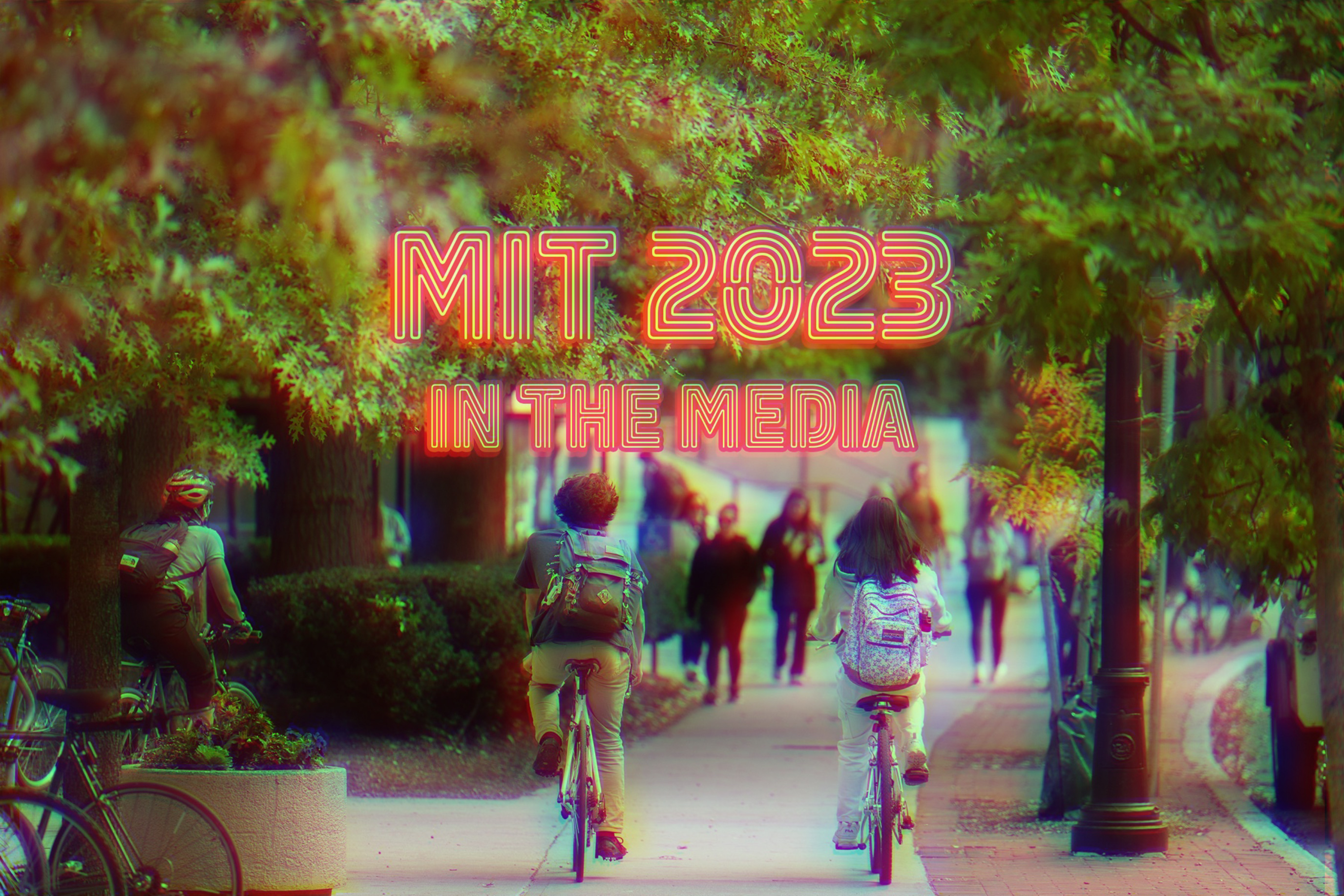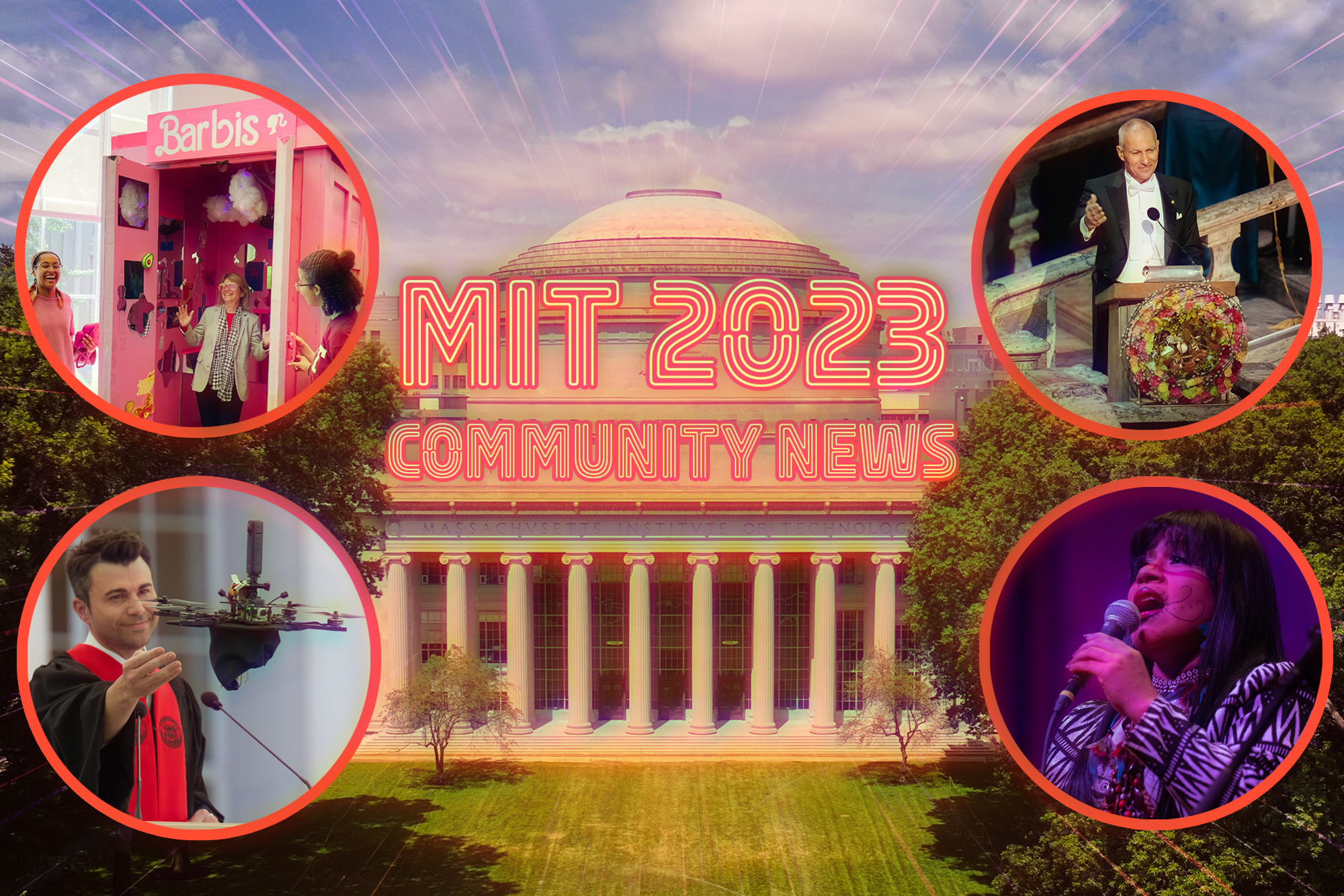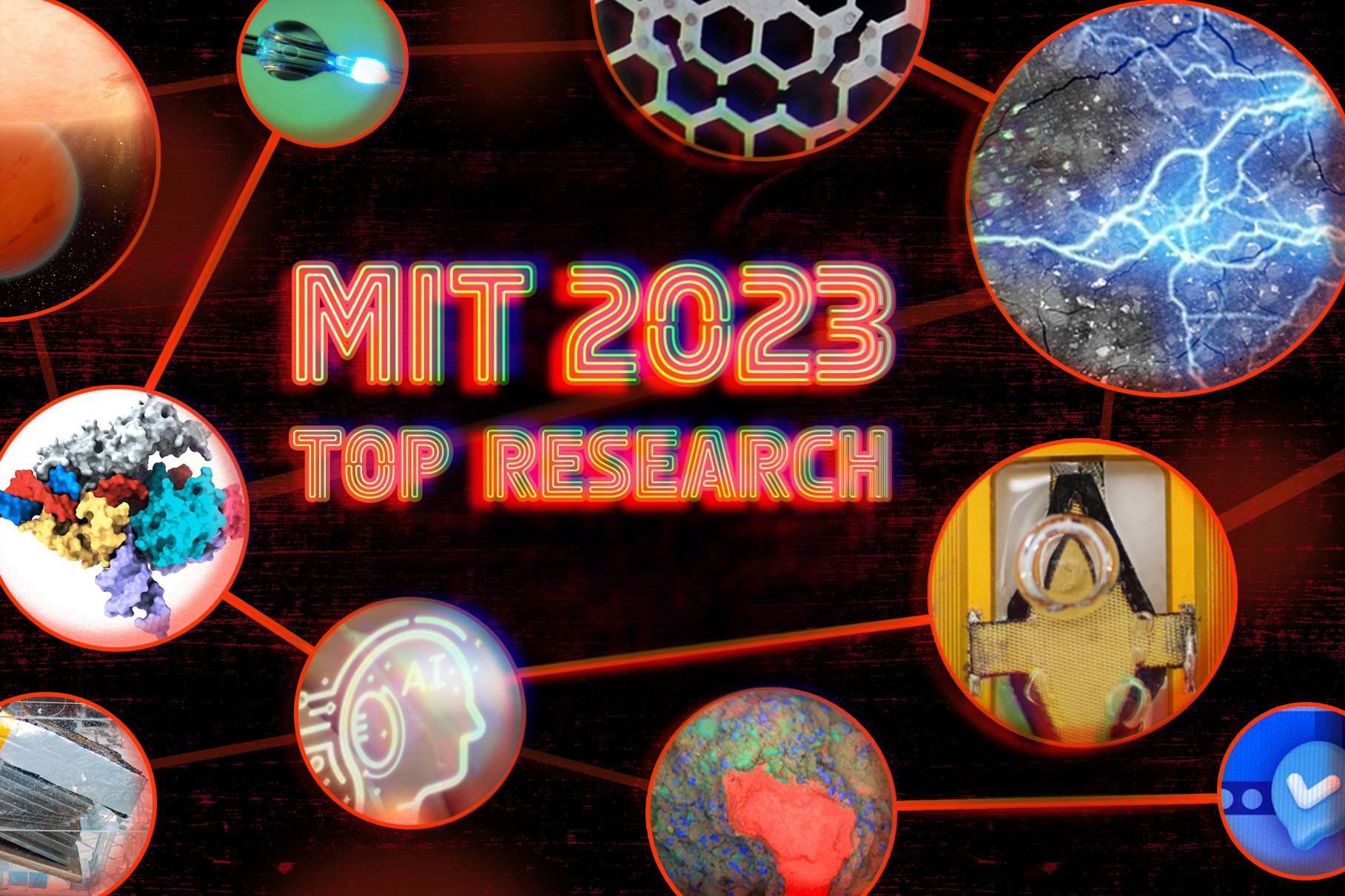Brian Suffoletto, MD, associate professor of emergency medicine, views interactions with patients in the Emergency Department as valuable…
Prepping for Data From the Nancy Grace Roman Space Telescope – Technology Org
As part of a plan to prepare for the quantity and range of data that will be coming…
Minicourse open to the MIT community gives context to the Middle East crisis

MIT community members can learn more about the Israel-Hamas conflict through a recently developed online course organized by Middle East and North Africa (MENA)/MIT at MIT’s Center for International Studies.
The three-session course, titled “Israel, Palestine, Gaza before and after October 7: Understanding historical context and contrasting narratives,” was first held between Nov. 29 and Dec. 13. More than 500 community members attended those sessions, including students, faculty, staff, and alumni.
The course instructor is Peter Krause PhD ’11, an associate professor of political science at Boston College who is also a research affiliate in MIT’s Security Studies Program and an expert on Middle East politics. Krause spent multiple years living in the region to conduct interviews with Israelis and Palestinians for his dissertation and first book, which focused on the history of the Zionist and Palestinian national movements.
“We wanted to create a jumping off point for constructive discussions in the MIT community,” Krause says. “I want people in the community to be able to have more engaging and informed discussions with each other. Providing this knowledge can allow people to understand each other better.”
“We all could use more understanding”
The sessions were split up into the history of Israelis, Palestinians, and their national movements; conflicts and peace in the region between 1948 and 2023; and a look at the current conflict and the future of Israeli-Palestinian relations.
The next session of the course will feature recordings of the first three sessions as well as a live Q&A with Krause, and will run between Dec. 18 and Jan. 3. Community members can register with their MIT email address.
More than 1,100 community members registered for the first session, including many alumni and faculty members.
“I don’t worry too much about headcount; I think even if we impact a small number of people, but impact them deeply, that can change the world,” says Associate Professor Richard Nielsen, MENA/MIT Faculty Director who is also member of the Security Studies Program and was involved in creating the course. “That said, a sizeable portion of the MIT community is seeking more information on these topics. We all could use more understanding and more ideas about this conflict. MIT is all ideas. When we think about making an impact at MIT, it has to be through education.”
Krause says he sought to provide context to the daily news updates on the conflict and to counter what he calls the “junk food information” snippets common on social media.
Building empathy
“One of the most important things that I hope comes out of these sessions is the building of empathy,” Krause says, which is why he focused the sessions on the narratives of Palestinian and Israelis, not just events. “I think if you have the ability to put yourself in other people’s shoes and in some small way understand what they’re experiencing and how they see things, that’s the basis for more positive engagement, not just in the MIT community but at large.”
Krause acknowledged that many community members aren’t able to take a semester-length course on this complex subject. The condensed course tries to accurately depict not just one Israeli perspective or one Palestinian perspective, but the range of opinions within each of those communities.
“When you start to break it down and show the diversity of opinion and experiences on each side, not only does that deepen understanding, but you also start to see the real stakes and the real people behind the news headlines,” Krause says. “I think that’s really important.”
Additional sessions with new updates are also being planned in February. The course is one of the Institute’s many initiatives aimed at bringing a deeper level of understanding to the MIT community.
“I hope whatever attendees’ political preferences are, they can learn from this, which will ground whatever feelings they have in greater knowledge,” Krause explains. “I believe greater knowledge is going to lead to not just greater understanding, but also better research, better policy, and then hopefully better relationships with people around us, because we understand each other more.”
MIT in the media: 2023 in review

It was an eventful trip around the sun for MIT this year, from President Sally Kornbluth’s inauguration and Mark Rober’s Commencement address to Professor Moungi Bawendi winning the Nobel Prize in Chemistry. In 2023 MIT researchers made key advances, detecting a dying star swallowing a planet, exploring the frontiers of artificial intelligence, creating clean energy solutions, inventing tools aimed at earlier detection and diagnosis of cancer, and even exploring the science of spreading kindness. Below are highlights of some of the uplifting people, breakthroughs, and ideas from MIT that made headlines in 2023.
The gift: Kindness goes viral with Steve Hartman
Steve Hartman visited Professor Anette “Peko” Hosoi to explore the science behind whether a single act of kindness can change the world.
Full story via CBS News
Trio wins Nobel Prize in chemistry for work on quantum dots, used in electronics and medical imaging
“The motivation really is the basic science. A basic understanding, the curiosity of ‘how does the world work?’” said Professor Moungi Bawendi of the inspiration for his research on quantum dots, for which he was co-awarded the 2023 Nobel Prize in Chemistry.
Full story via the Associated Press
How MIT’s all-women leadership team plans to change science for the better
President Sally Kornbluth, Provost Cynthia Barnhart, and Chancellor Melissa Nobles emphasized the importance of representation for women and underrepresented groups in STEM.
Full story via Radio Boston
MIT via community college? Transfer students find a new path to a degree
Undergraduate Subin Kim shared his experience transferring from community college to MIT through the Transfer Scholars Network, which is aimed at helping community college students find a path to four-year universities.
Full story via the Christian Science Monitor
MIT president Sally Kornbluth doesn’t think we can hit the pause button on AI
President Kornbluth discussed the future of AI, ethics in science, and climate change with columnist Shirley Leung on her new “Say More” podcast. “I view [the climate crisis] as an existential issue to the extent that if we don’t take action there, all of the many, many other things that we’re working on, not that they’ll be irrelevant, but they’ll pale in comparison,” Kornbluth said.
Full story via The Boston Globe
It’s the end of a world as we know it
Astronomers from MIT, Harvard University, Caltech and elsewhere spotted a dying star swallowing a large planet. Postdoc Kishalay De explained that: “Finding an event like this really puts all of the theories that have been out there to the most stringent tests possible. It really opens up this entire new field of research.”
Full story via The New York Times
Frontiers of AI
Hey, Alexa, what should students learn about AI?
The Day of AI is a program developed by the MIT RAISE initiative aimed at introducing and teaching K-12 students about AI. “We want students to be informed, responsible users and informed, responsible designers of these technologies,” said Professor Cynthia Breazeal, dean of digital learning at MIT.
Full story via The New York Times
AI tipping point
Four faculty members from across MIT — Professors Song Han, Simon Johnson, Yoon Kim and Rosalind Picard — described the opportunities and risks posed by the rapid advancements in the field of AI.
Full story via Curiosity Stream
A look into the future of AI at MIT’s robotics laboratory
Professor Daniela Rus, director of MIT’s Computer Science and Artificial Intelligence Laboratory, discussed the future of artificial intelligence, robotics, and machine learning, emphasizing the importance of balancing the development of new technologies with the need to ensure they are deployed in a way that benefits humanity.
Full story via Mashable
Health care providers say artificial intelligence could transform medicine
Professor Regina Barzilay spoke about her work developing new AI systems that could be used to help diagnose breast and lung cancer before the cancers are detectable to the human eye.
Full story via Chronicle
Is AI coming for your job? Tech experts weigh in: “They don’t replace human labor”
Professor David Autor discussed how the rise of artificial intelligence could change the quality of jobs available.
Full story via CBS News
Big tech is bad. Big AI will be worse.
Institute Professor Daron Acemoglu and Professor Simon Johnson made the case that “rather than machine intelligence, what we need is ‘machine usefulness,’ which emphasizes the ability of computers to augment human capabilities.”
Full story via The New York Times
Engineering excitement
MIT’s 3D-printed hearts could pump new life into customized treatments
MIT engineers developed a technique for 3D printing a soft, flexible, custom-designed replica of a patient’s heart.
Full story via WBUR
Mystery of why Roman buildings have survived so long has been unraveled, scientists say
Scientists from MIT and other institutions discovered that ancient Romans used lime clasts when manufacturing concrete, giving the material self-healing properties.
Full story via CNN
The most interesting startup in America is in Massachusetts. You’ve probably never heard of it.
VulcanForms, an MIT startup, is at the “leading edge of a push to transform 3D printing from a niche technology — best known for new-product prototyping and art-class experimentation — into an industrial force.”
Full story via The Boston Globe
Catalyzing climate innovations
Can Boston’s energy innovators save the world?
Boston Magazine reporter Rowan Jacobsen spotlighted how MIT faculty, students, and alumni are leading the charge in clean energy startups. “When it comes to game-changing breakthroughs in energy, three letters keep surfacing again and again: MIT,” writes Jacobsen.
Full story via Boston Magazine
MIT research could be game changer in combating water shortages
MIT researchers discovered that a common hydrogel used in cosmetic creams, industrial coatings, and pharmaceutical capsules can absorb moisture from the atmosphere even as the temperature rises. “For a planet that’s getting hotter, this could be a game-changing discovery.”
Full story via NBC Boston
Energy-storing concrete could form foundations for solar-powered homes
MIT engineers uncovered a new way of creating an energy supercapacitor by combining cement, carbon black, and water that could one day be used to power homes or electric vehicles.
Full story via New Scientist
MIT researchers tackle key question of EV adoption: When to charge?
MIT scientists found that delayed charging and strategic placement of EV charging stations could help reduce additional energy demands caused by more widespread EV adoption.
Full story via Fast Company
Building better buildings
Professor John Fernández examined how to reduce the climate footprints of homes and office buildings, recommending creating airtight structures, switching to cleaner heating sources, using more environmentally friendly building materials, and retrofitting existing homes and offices.
Full story via The New York Times
They’re building an “ice penetrator” on a hillside in Westford
Researchers from MIT’s Haystack Observatory built an “ice penetrator,” a device designed to monitor the changing conditions of sea ice.
Full story via The Boston Globe
Healing health solutions
How Boston is beating cancer
MIT researchers are developing drug-delivery nanoparticles aimed at targeting cancer cells without disturbing healthy cells. Essentially, the nanoparticles are “engineered for selectivity,” explained Professor Paula Hammond, head of MIT’s Department of Chemical Engineering.
Full story via Boston Magazine
A new antibiotic, discovered with artificial intelligence, may defeat a dangerous superbug
Using a machine-learning algorithm, researchers from MIT discovered a type of antibiotic that’s effective against a particular strain of drug-resistant bacteria.
Full story via CNN
To detect breast cancer sooner, an MIT professor designs an ultrasound bra
MIT researchers designed a wearable ultrasound device that attaches to a bra and could be used to detect early-stage breast tumors.
Full story via STAT
The quest for a switch to turn on hunger
An ingestible pill developed by MIT scientists can raise levels of hormones to help increase appetite and decrease nausea in patients with gastroparesis.
Full story via Wired
Here’s how to use dreams for creative inspiration
MIT scientists found that the earlier stages of sleep are key to sparking creativity and that people can be guided to dream about specific topics, further boosting creativity.
Full story via Scientific American
Astounding art
An AI opera from 1987 reboots for a new generation
Professor Tod Machover discussed the restaging of his opera “VALIS” at MIT, which featured an artificial intelligence-assisted musical instrument developed by Nina Masuelli ’23.
Full story via The Boston Globe
Surfacing the stories hidden in migration data
Associate Professor Sarah Williams discussed the Civic Data Design Lab’s “Motivational Tapestry,” a large woven art piece that uses data from the United Nations World Food Program to visually represent the individual motivations of 1,624 Central Americans who have migrated to the U.S.
Full story via Metropolis
Augmented reality-infused production of Wagner’s “Parsifal” opens Bayreuth Festival
Professor Jay Scheib’s augmented reality-infused production of Richard Wagner’s “Parsifal” brought “fantastical images” to audience members.
Full story via the Associated Press
Understanding our universe
New image reveals violent events near a supermassive black hole
Scientists captured a new image of M87*, the black hole at the center of the Messier 87 galaxy, showing the “launching point of a colossal jet of high-energy particles shooting outward into space.”
Full story via Reuters
Gravitational waves: A new universe
MIT researchers Lisa Barsotti, Deep Chatterjee, and Victoria Xu explored how advances in gravitational wave detection are enabling a better understanding of the universe.
Full story via Curiosity Stream
Nergis Mavalvala helped detect the first gravitational wave. Her work doesn’t stop there
Professor Nergis Mavalvala, dean of the School of Science, discussed her work searching for gravitational waves, the importance of skepticism in scientific research, and why she enjoys working with young people.
Full story via Wired
Hitting the books
“The Transcendent Brain” review: Beyond ones and zeroes
In his book “The Transcendent Brain: Spirituality in the Age of Science,” Alan Lightman, a professor of the practice of humanities, displayed his gift for “distilling complex ideas and emotions to their bright essence.”
Full story via The Wall Street Journal
What happens when CEOs treat workers better? Companies (and workers) win.
Professor of the practice Zeynep Ton published a book, “The Case for Good Jobs,” and is “on a mission to change how company leaders think, and how they treat their employees.”
Full story via The Boston Globe
How to wage war on conspiracy theories
Professor Adam Berinsky’s book, “Political Rumors: Why We Accept Misinformation and How to Fight it,” examined “attitudes toward both politics and health, both of which are undermined by distrust and misinformation in ways that cause harm to both individuals and society.”
Full story via Politico
What it takes for Mexican coders to cross the cultural border with Silicon Valley
Assistant Professor Héctor Beltrán discussed his new book, “Code Work: Hacking across the U.S./México Techno-Borderlands,” which explores the culture of hackathons and entrepreneurship in Mexico.
Full story via Marketplace
Cultivating community
The Indigenous rocketeer
Nicole McGaa, a fourth-year student at MIT, discussed her work leading MIT’s all-Indigenous rocket team at the 2023 First Nations Launch National Rocket Competition.
Full story via Nature
“You totally got this,” YouTube star and former NASA engineer Mark Rober tells MIT graduates
During his Commencement address at MIT, Mark Rober urged graduates to embrace their accomplishments and boldly face any challenges they encounter.
Full story via The Boston Globe
MIT Juggling Club going strong after half century
After almost 50 years, the MIT Juggling Club, which was founded in 1975 and then merged with a unicycle club, is the oldest drop-in juggling club in continuous operation and still welcomes any aspiring jugglers to come toss a ball (or three) into the air.
Full story via Cambridge Day
Volpe Transportation Center opens as part of $750 million deal between MIT and feds
The John A. Volpe National Transportation Systems Center in Kendall Square was the first building to open in MIT’s redevelopment of the 14-acre Volpe site that will ultimately include “research labs, retail, affordable housing, and open space, with the goal of not only encouraging innovation, but also enhancing the surrounding community.”
Full story via The Boston Globe
Sparking conversation
The future of AI innovation and the role of academics in shaping it
Professor Daniela Rus emphasized the central role universities play in fostering innovation and the importance of ensuring universities have the computing resources necessary to help tackle major global challenges.
Full story via The Boston Globe
Moving the needle on supply chain sustainability
Professor Yossi Sheffi examined several strategies companies could use to help improve supply chain sustainability, including redesigning last-mile deliveries, influencing consumer choices and incentivizing returnable containers.
Full story via The Hill
Expelled from the mountain top?
Sylvester James Gates Jr. ’73, PhD ’77 made the case that “diverse learning environments expose students to a broader range of perspectives, enhance education, and inculcate creativity and innovative habits of mind.”
Full story via Science
Marketing magic of “Barbie” movie has lessons for women’s sports
MIT Sloan Lecturer Shira Springer explored how the success of the “Barbie” movie could be applied to women’s sports.
Full story via Sports Business Journal
We’re already paying for universal health care. Why don’t we have it?
Professor Amy Finkelstein asserted that the solution to health insurance reform in the U.S. is “universal coverage that is automatic, free and basic.”
Full story via The New York Times
The internet could be so good. Really.
Professor Deb Roy described how “new kinds of social networks can be designed for constructive communication — for listening, dialogue, deliberation, and mediation — and they can actually work.”
Full story via The Atlantic
Fostering educational excellence
MIT students give legendary linear algebra professor standing ovation in last lecture
After 63 years of teaching and over 10 million views of his online lectures, Professor Gilbert Strang received a standing ovation after his last lecture on linear algebra. “I am so grateful to everyone who likes linear algebra and sees its importance. So many universities (and even high schools) now appreciate how beautiful it is and how valuable it is,” said Strang.
Full story via USA Today
“Brave Behind Bars”: Reshaping the lives of inmates through coding classes
Graduate students Martin Nisser and Marisa Gaetz co-founded Brave Behind Bars, a program designed to provide incarcerated individuals with coding and digital literacy skills to better prepare them for life after prison.
Full story via MSNBC
Melrose TikTok user “Ms. Nuclear Energy” teaching about nuclear power through social media
Graduate student Kaylee Cunningham discussed her work using social media to help educate and inform the public about nuclear energy.
Full story via CBS Boston
MIT community in 2023: A year in review

The year 2023 saw the turning of a new page for MIT, as the Institute welcomed its 18th president. MIT also saw the opening of new and renovated spaces, launched a new “Dialogues Across Difference” speaker series, and celebrated a Nobel Prize, Turing Award, National Medals of Technology and Science, and many more honors for its distinguished community members. Here are some of the key stories out of MIT this year.
Presidential transition
In January, the MIT community welcomed Sally Kornbluth, a biologist and former provost of Duke University, as its new president. She immediately got to work engaging in a campus-wide listening tour, which yielded feedback from many in the community.
In May, as part of a multi-day celebration, Kornbluth was officially inaugurated as the Institute’s 18th president, succeeding L. Rafael Reif. Kornbluth’s inaugural address covered a range of matters while connecting them back to the idea that higher education can best realize its potential for society as a collaborative enterprise.
Not to be outdone by Institute Events, a few months later a group of incoming MIT students surprised Kornbluth with a custom-built “Barbis,” a life-sized Barbie-themed TARDIS, inside her office.
Among other administrative transitions in 2023: Maria Zuber was named presidential advisor for science and technology policy, Paula Hammond was named vice provost for faculty, Denzil Streete was named senior associate dean and director of the Office of Graduate Education, and Philip Erickson was named director of MIT Haystack Observatory. Eric Evans also stepped down as director of MIT Lincoln Laboratory, John Dozier stepped down as Institute Community and Equity Officer, and John Durant stepped down as director of the MIT Museum.
Standing Together Against Hate
In November, President Kornbluth launched Standing Together Against Hate, a community-driven initiative coordinated by Chancellor Melissa Nobles. The initiative will support efforts led by MIT faculty, staff, students, and the administration to come together, MIT-style, to use problem-solving skills to address antisemitism, Islamophobia, and other forms of hate.
A Nobel and other top accolades
In October, Professor Moungi Bawendi won the Nobel Prize in Chemistry for his influential work on quantum dots. See what his first day as a Nobel laureate looked like, and view photos from Nobel Week earlier this month.
Three MIT affiliates — James Fujimoto, Eric Swanson, and David Huang — won the Lasker Award in September for their work on optical coherence tomography. The trio was also honored, along with Subra Suresh, by President Joe Biden at this year’s National Medals of Science and Technology ceremony. And Bob Metcalfe received the Turing Award, known to many as the “Nobel of computing,” for the invention of Ethernet.
At MIT, Institute Professor Paula Hammond won this year’s Killian Award, the Institute’s highest faculty honor.
“Dialogues Across Difference”
In March, a new “Dialogues Across Difference” speaker series launched as a way to create opportunities for community members to learn how to think about taking on difficult subjects across differences of opinion, background, viewpoint, and life experience.
The first speaker in the series was John Tomasi, president of Heterodox Academy, who emphasized the importance of humility in community and intellectual life as a means of engaging with differing perspectives and difficult questions. In November, Malick Ghachem, head of MIT’s History Section, described the dynamics of universities and other complex institutions seeking to be neutral on contentious civic and global matters.
Commencement
At Commencement in June, Mark Rober — engineer, inventor, and YouTuber — delighted new graduates and their loved ones with some technical whimsy, and then encouraged graduates to positively impact the world while practicing “optimism combined with dedication” and fostering relationships with others.
President Kornbluth followed with her charge to the Class of 2023, urging them to cultivate “curiosity and a sense of larger purpose” while finding their pursuits in life.
New and refreshed spaces
A number of new and refreshed spaces opened at MIT and in the surrounding community this year. Among them: The Hobby Shop and Cheney Room received makeovers, while a new materials science Breakerspace opened along the Infinite Corridor. The Student Center partially reopened after renovations and is expected to return to full operation in 2024.
In Kendall Square, the new John A. Volpe National Transportation Systems Center opened after nearly a decade of collaboration with the Institute. MIT designed and constructed the highly energy-efficient building as part of an agreement that will allow the Institute to develop 10 additional acres of land in Kendall Square that are no longer needed by the federal government.
Student honors and awards
As in past years, MIT undergraduates earned prestigious international awards. In 2023, exceptional students were awarded Fulbright, Marshall, Rhodes, and Schwarzman scholarships, among many others.
Some students scored big in other ways. Justin Yu became the top Tetris player on the planet by winning the 2023 Classic Tetris World Championships. MIT students once again defended their title at the Putnam Mathematical Competition. And graduate student and former soccer star Karenna Groff ’22 was named NCAA Woman of the Year.
Remembering those we’ve lost
Among MIT community members who died this year were Peter Baddoo, George Clark, Thomas Coveney, Stephen Goldman, Priscilla King Gray, Arnoldo Hax, Frederick Hennie, Walter Hollister, Judy Hoyt, Roman Jackiw, Willard Johnson, Evelyn Fox Keller, Nelson Yuan-sheng Kiang, Mel King, Sanjoy Mitter, Mary Morrissey, Paul Parravano, Bill Pounds, Edgar Schein, Dick Thornton, and Christopher Walsh.
In case you missed it:
Additional top community stories of 2023 included a roundup of new books from MIT authors, a profile of MIT’s unique all-Institute Writers’ Group, a video and profile of Barry Duncan, the Institute’s resident palindrome poet; and a series of numbers to describe the career of Gil Strang, a recently retired and much beloved professor of mathematics.
MIT’s top research stories of 2023

It has been another prolific year for MIT’s research community in 2023. As we close out the year, MIT News looks back at some of our most popular stories from the last 12 months.
We’ve also rounded up the year’s top MIT community-related stories.
- Cheaper water desalination: MIT engineers and collaborators developed a desalination system that can produce freshwater that is even cheaper than tap water. The passive, solar-powered device avoids the salt-clogging issues that plague other designs.
- Why was Roman concrete so durable? Researchers discovered ancient concrete-manufacturing strategies that gave Roman concrete its famed durability. The work may hold the key to designing concrete that lasts for millennia.
- ChatGPT boosts worker productivity: Two PhD students in MIT’s Department of Economics found that ChatGPT increased productivity for workers assigned tasks like writing cover letters or delicate emails, and cost-benefit analyses. The tasks in the study weren’t quite replicas of real work, but access to ChatGPT decreased the time it took workers to complete them by 40 percent and improved output quality.
- Injection-free diabetes control: Providing a possible treatment approach for Type 1 diabetes, engineers designed an implantable device that carries hundreds of thousands of insulin-producing islet cells. It also has its own on-board oxygen factory, which generates oxygen by splitting water vapor found in the body, to keep the cells healthy.
- Unraveling connections between the brain and gut: MIT engineers designed fibers embedded with a variety of sensors, as well as light sources for optogenetic stimulation, that can control neural circuits connecting the gut and the brain. By manipulating intestine cells in mice, the researchers demonstrated that the technology could induce feelings of fullness or reward-seeking behavior.
- The “whom of which” trend: An MIT linguistics professor and student explored the emergence of a new kind of sentence construction, finding that the phrase “whom of which” obeys very specific rules whose nature contributes to a larger discussion about syntax. The article sparked broad interest from members of our audience, many whom of which read it.
- A supercapacitor made from ancient materials: A new kind of supercapacitor could provide cheap and scalable energy storage for renewable energy sources. The device is made from ancient, ubiquitous materials including cement, carbon black, and water.
- An earth-like exoplanet: MIT scientists discovered one of the smallest exoplanets ever measured, named Kepler 78b. The exoplanet is about 1.7 times as massive as the Earth and about 1.2 times Earth’s size, but it’s too hot to support life. The search continues.
- A wearable ultrasound scanner: MIT researchers designed a wearable ultrasound device that could be incorporated into a bra to allow people to detect breast cancer earlier. The device could be worn by people at high risk of developing breast cancer between routine mammograms.
- A new tool to edit the human genome: A newly discovered CRISPR-like system could one day be harnessed to edit DNA more precisely than CRISPR/Cas systems. It is the first RNA-guided, DNA-cutting enzyme found in eukaryotes.
Connectivity Revolution: How 5G is Reshaping the Future of Manufacturing
Gone are the days when we expected a seamless collaboration environment interconnected by a powerful network. Recently, it has gone from an impossible to do list to a reality with the introduction of 5G technology in a number of business applications. When it comes to the…
Insomniac Games Hacked By Ransomware Group, Resulting In 1 TB Of Leaked Game Info And More
Last week, ransomware group Rhysida revealed it had hacked Marvel’s Spider-Man 2 developer, Insomniac Games. It posted images to prove the validity of its claim, demanding 50 bitcoin – roughly $2 million – from Sony within seven days or it would leak what it had discovered, as reported by CyberDaily. Sony did not comply with the demand and now the group has released more than a terabyte of hacked data pertaining to Insomniac Games.
The total leak comprises more than 1.3 million files, for a total of 1.67 terabytes of data, according to VideoGamesChronicle via CyberDaily. The leaked data includes information about Marvel’s Spider-Man, future Insomniac Games titles, release schedules, and private employee information like tax and employment forms, internal studio messages, and more. Game Informer will not be disclosing any of the hacked information.

CyberDaily reached out to Rhysida and learned the ransomware group specifically targeted Insomniac Games. “Yes, we knew who we were attacking,” a Rhysida spokesperson told the publication over email. The group also told CyberDaily its motivation for the hack was financial.
Insomniac Games just released Marvel’s Spider-Man 2, which we loved – you can read about why in Game Informer’s review here. The studio revealed Marvel’s Wolverine back in 2021, revealing this year that the game takes place in the same universe as Marvel’s Spider-Man.
[Source: VideoGamesChronicle via CyberDaily]
Penny’s Big Breakaway From The Creators Of Sonic Mania | New Gameplay Today

Following the release of Sonic Mania (and its various follow-up versions), director Christian Whitehead and friends decided to start developer Evening Star to do one of the most difficult things in video games: create a brand new original property. Penny’s Big Breakaway is a new character in a unique platformer and we had a chance to go hands on with it ahead of its release next year.
Join Game Informer’s Wesley LeBlanc and Kyle Hilliard as they play a few levels and discuss what’s potentially cool about the game. And also make sure to keep an eye out for the latest issue of Game Informer magazine where you can find a big feature on the game alongside interviews with its creator.
[embedded content]
Head over to Game Informer’s YouTube channel for more previews, reviews, and discussions of new and upcoming games. Watch other episodes of New Gameplay Today right here.
The Final Fantasy VII Rebirth Digital Issue Is Now Live!

If you subscribe to the digital edition of Game Informer, you can now learn all about Final Fantasy VII Rebirth! Following the cover reveal our digital issue is now live on web browsers, iPad/iPhone, and Android devices. Alongside the cover story, you will also find big features on Marvel’s Spider-Man 2 credits, Prince of Persia: The Lost Crown, Penny’s Big Breakaway, the remake of Riven, and much more. We’ve also got previews for the next Grand Theft Auto, Tekken 8, our year-end best ofs, including the top 10 games of 2023, reader picks, and much more!
Individual issues are also now available for purchase at this link or in any GameStop store.
You can download the apps to read the issue by following this link.
